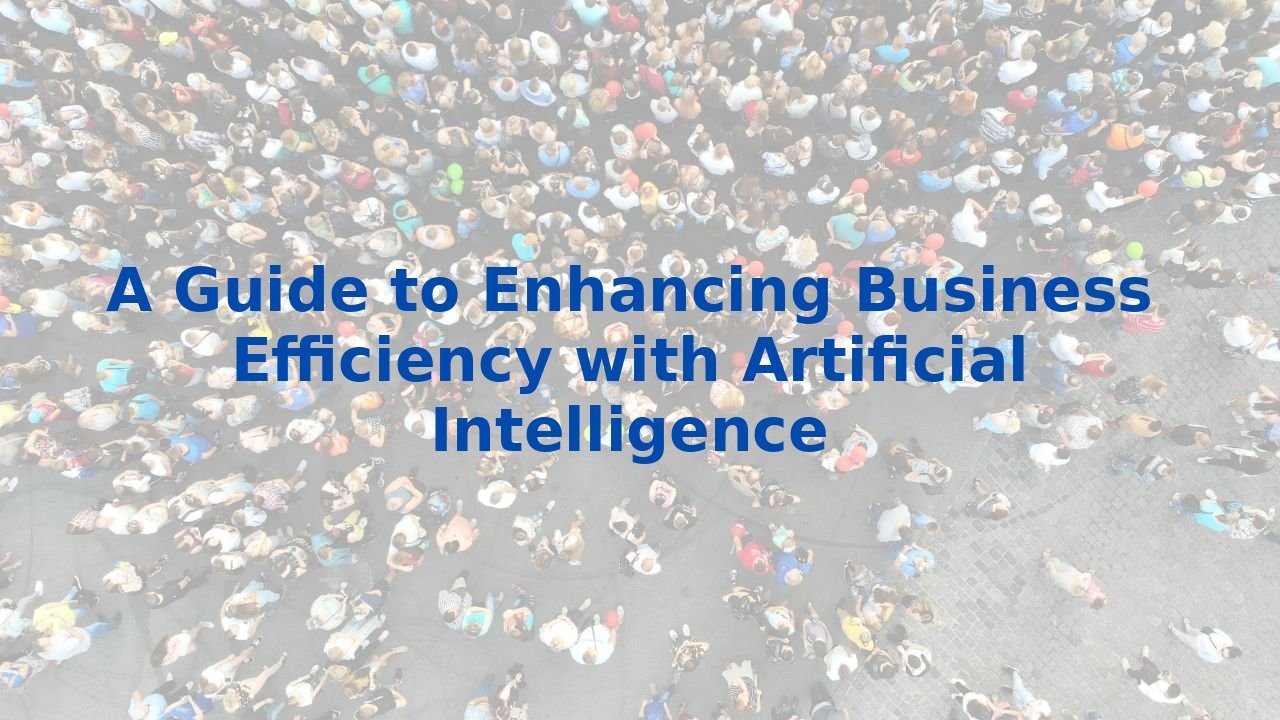A Guide To Enhancing Business Efficiency with Artificial Intelligence
A Guide To Enhancing Business Efficiency with Artificial Intelligence
In our fast-paced world, the quest for operational excellence has led organizations to uncover incredible opportunities in the realm of artificial intelligence (AI). The potential of AI to transform business efficiency is monumental, further solidifying its role as an essential ally in the daily operations of modern companies. Let’s delve into how AI enhances various business processes and unlocks unparalleled productivity gains.
Automating Routine Tasks
One of the most transformative aspects of AI is its ability to automate mundane, repetitive tasks that consume time and resources. Activities such as data entry, invoice processing, and appointment scheduling can now be managed effortlessly through AI-powered tools. By redefining these workflows, companies can significantly minimize human error and reduce the time spent on low-value activities.
This automation not only streamlines processes but liberates employees, allowing them to dedicate their energy to strategic and creative endeavors that foster innovation and business growth. Imagine your teams focusing on high-impact projects rather than being bogged down by rote tasks.
Process Optimization
But the journey doesn’t stop at automation. AI excels at process optimization. By analyzing workflows and identifying bottlenecks, redundancies, and inefficiencies, AI provides actionable insights to reshape operations. Companies can then reallocate resources and eliminate unnecessary procedures, cultivating a leaner and more cost-effective framework.
This continual cycle of refinement enhances both the speed and quality of outputs, ultimately delighting customers and stakeholders alike. In today’s competitive landscape, agility is vital; AI's capacity to optimize workflows positions organizations to adapt swiftly to changing demands.
Quality Control and Assurance
In industries where quality is paramount, AI-driven solutions fortify the reliability of products and services. By employing real-time monitoring systems, AI can preemptively detect defects, thereby ensuring that only the highest-quality products make it to market. This added layer of scrutiny mitigates waste while protecting a company’s reputation—two priceless assets that affect long-term success.
Risk Management
The ability of AI to analyze vast datasets and provide forecasts is invaluable for risk management. With the capacity to discern patterns and detect emerging trends, organizations can better assess market volatility and potential disruptions. Armed with these insights, leaders can make proactive decisions that fortify their company against unforeseen challenges.
Supply Chain Management
The unpredictability of global supply chains necessitates a solution rooted in precision and adaptability. AI’s analytical prowess allows organizations to anticipate demand fluctuations, optimize inventory levels, and devise efficient shipping routes. These enhancements yield quicker response times and reduced operational costs, contributing to an exceptionally agile supply chain ecosystem.
Enhancing Employee Training and Productivity
A pivotal component of integrating AI into an organization involves transforming employee training methodologies. AI-powered learning platforms adjust to individual learning styles, which results in heightened engagement and knowledge retention. This tailored experience accelerates employee productivity by equipping them with the tools necessary for problem-solving and decision-making.
Fraud Detection
In an era where security breaches can result in devastating consequences, AI’s ability to identify fraudulent activities swiftly is a game changer. By recognizing deviations in transaction data and user behavior, organizations can act promptly, safeguarding both company resources and sensitive customer information.
Amplifying Employee Productivity
The statistics are compelling: research indicates that employees equipped with generative AI tools can increase productivity significantly. Imagine support agents handling 13.8% more inquiries, or programmers completing 126% more projects per week. AI is no longer just a tool; it is a catalyst for enhanced performance across the board.
Benefits of Integrating AI into Daily Workflows
- Efficiency and Productivity Gains: By automating routine tasks, AI enables employees to engage in higher-order thinking and decision-making.
- Improved Speed of Business: The faster processing capabilities of AI lead to shorter business cycles, enhancing overall value and ROI.
- Better Decisions: Data-driven insights derived from AI analytics facilitate informed decision-making, reducing reliance on gut feelings.
- Quality Enhancement and Error Reduction: AI reduces human error, improving operational fidelity and compliance with standards.
Training Employees for AI
As organizations pivot towards AI, training becomes critical. Implementing effective AI training programs can bridge skill gaps within teams. Generative AI has demonstrated its ability to uplift overall performance, as even less experienced employees can significantly enhance their capacities with AI support. By nurturing a culture of continuous learning and collaboration with intelligent systems, businesses can unlock new potential, preparing their workforce for the future of work.
Conclusion
In summary, the integration of AI stands as a transformative force in enhancing business efficiency. By automating routine tasks, optimizing operations, and improving decision-making, companies can elevate productivity to new heights. Moreover, equipping employees with the necessary training will not only narrow skill gaps but also foster a more innovative work environment.
As the motivation to embrace AI intensifies, organizations have a remarkable opportunity ahead. The pursuit of excellence is no longer an abstract notion; it is an achievable reality fueled by AI—where businesses can redefine efficiency, creativity, and adaptability. Embracing this journey may very well secure a competitive advantage in the ever-evolving business landscape.



